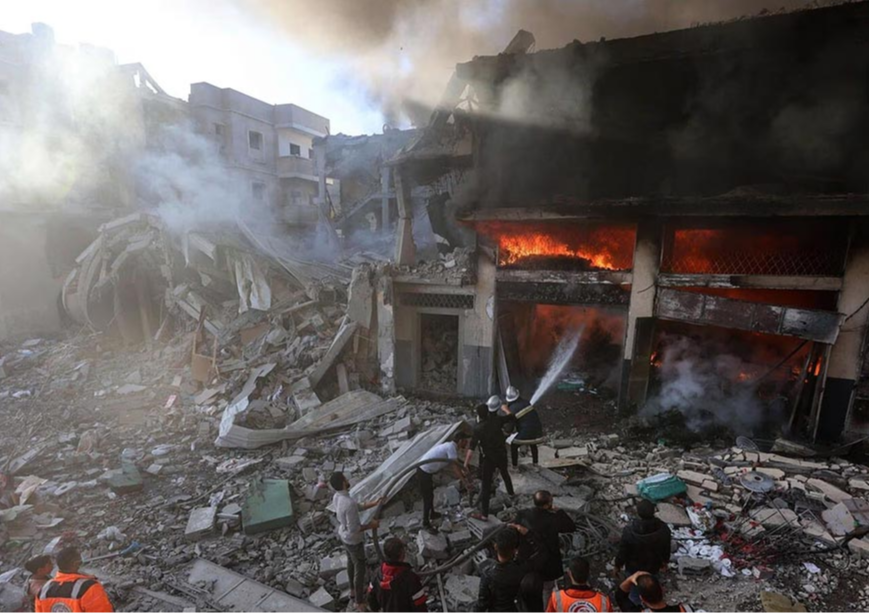It should go without saying that fighting wars is a nasty business. The political, economic and moral corrosion that wars bring with their onslaught is often difficult for distant onlookers to dcipher from the outside. In a contemporary context, this is especially true; for people who are not involved directly, wars are largely an audio-visual experience, to be imbibed merely as information or entertainment, devoid of their political and strategic contexts. And for a large part of the developed world, which had lulled itself into believing that wars would only be fought in faraway lands without imposing any significant costs directly, this is a moment of reckoning.
Europe is struggling to find an adequate response to the challenge of managing Russian aggression against Ukraine. When French President Emmanuel Macron recently suggested that while there was “no consensus” on sending Western troops to Ukraine, “nothing should be excluded,” it resulted in a strong response not only from the Russians, but also from the US and France’s European partners such as Germany and the UK.
Europe is struggling to find an adequate response to the challenge of managing Russian aggression against Ukraine.
The US promptly made it clear that the “path to victory” in Europe is to provide Ukraine with military aid, “so Ukrainian troops have the weapons and ammunition they need to defend themselves,” and that “the US will not send troops to fight in Ukraine.” The UK too underlined that it had no plans for a large-scale military deployment to Ukraine, beyond the small number of personnel already training Ukrainian armed forces. German Chancellor Olaf Scholz also reiterated that no European country or Nato member state would send troops to Ukraine.
This is a delicate moment in the Ukraine war. Two years into the conflict, Russia seems to have an upper hand on the battlefield. It has gained some ground in the last few weeks, though its strategic utility remains disputed. While Putin seems to have realized that he just needs to wait this out in the context of political polarization in the US and public disaffection in European countries, the West is still trying to work out a position that can convey with a degree of credibility that it would stand by Ukraine even as costs—both economic and political—might continue to rise. On one hand, while an American aid package for Ukraine is stuck in the US House of Representatives, Europeans are finding it difficult to even come out with consensus statements in support of Ukraine. Last week, Hungary blocked a statement shepherded by the European Council President Charles Michel, pledging “unwavering” support for Ukraine. So while Macron can maintain that “the defeat of Russia is indispensable to security and stability in Europe,” it is not clear if the West has adequate means available to achieve this end. Russia has no such constraints, as its war aims are being supported by its own economy on a war footing as well as its allies like North Korea and Iran.
While an American aid package for Ukraine is stuck in the US House of Representatives, Europeans are finding it difficult to even come out with consensus statements in support of Ukraine.
The other war that is raging in the Middle East is also showing no signs of coming to a conclusion, despite US President Joe Biden’s claims that he is hopeful of a ceasefire by next week. This war began when Israel launched a large-scale air and ground campaign in Gaza after Hamas terrorists killed about 1,200 people in southern Israel last October, and has now entered a phase where there is a worldwide focus on the humanitarian crisis Israeli actions have unleashed. Israel is now under pressure not to launch an offensive in Rafah, which its military believes is the last holdout of Hamas but where there are about 1.5 million Palestinians taking shelter as well.
But Israeli forces have struggled with getting their strategy right from the very beginning. Their tactics have resulted in a lot of destruction and some ostensible degradation of Hamas capabilities, but beyond that, Israel’s Binyamin Netanyahu government has not offered any real coherent plan for moving forward in Gaza when it comes to governance and reconstruction.
Israel is having to fight on multiple fronts, with Hamas and Hezbollah militants as well as Iranian proxies in Syria, Iraq and Yemen targeting it. As a consequence, threat of escalation remains high and America’s Joe Biden administration is under political pressure at home to restrain Israeli forces.
Western societies and politics are shaped by their aversion to casualties while the other side seems to have no such compunction.
While support for Ukraine languishes in Western capitals, support for Israel is also wavering. Both are dependent on external support as a key variable in their battle strategies and both find themselves vulnerable. In both theatres, information is being deployed effectively to turn the tide of the war in favour of one side or the other. And in both cases, Western societies and politics are shaped by their aversion to casualties while the other side seems to have no such compunction. This means that both Ukraine and Israel are facing a challenge in bringing their ends, ways and means in sync to achieve sustainable battlefield and political outcomes. And it is this lack of strategic coherence that is now putting pressure on one country which saw its territorial sovereignty violated by a powerful neighbour and another that suffered a brutal terror attack on its citizens. It can only be hoped that Indian policymakers and military planners are learning the right lessons from these conflicts that show no sign of coming to a conclusive end anytime soon.
This commentary originally appeared in Mint.
The views expressed above belong to the author(s). ORF research and analyses now available on Telegram! Click here to access our curated content — blogs, longforms and interviews.




 PREV
PREV


